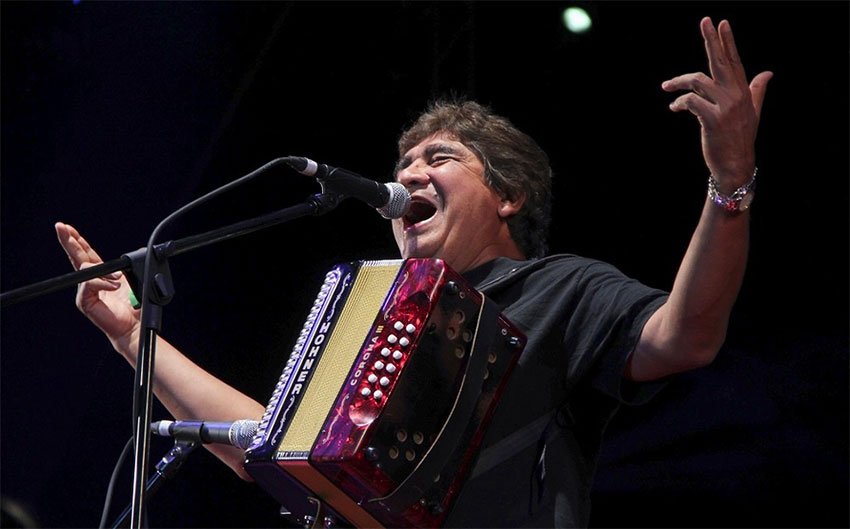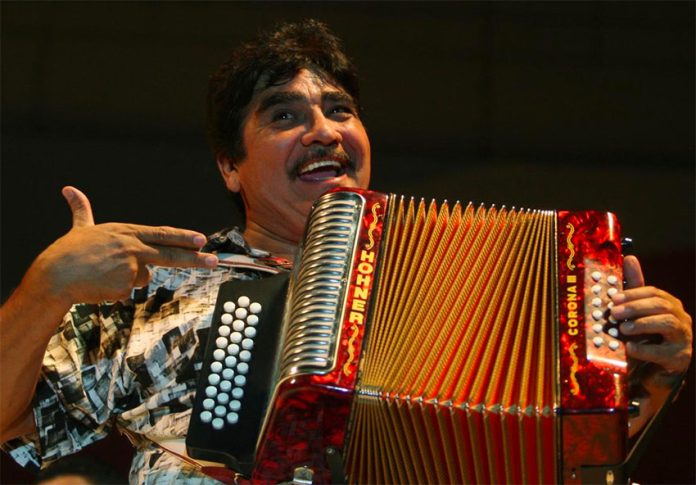Celso Piña, a cumbia music legend who was known as “the rebel of the accordion,” died on Wednesday in his home town of Monterrey, Nuevo León.
The singer, songwriter, composer and accordionist passed away in the San Vicente Hospital after suffering a heart attack. He was 66.
Piña’s record label, La Tuna Records, announced the death in a brief statement.
“With deep pain, we communicate the unexpected departure of the maestro Celso Piña who passed away today [Wednesday] in Monterrey at 12:38pm from a heart attack,” the statement said.
“Our deepest condolences to his family, friends and fans. We’re left with an intense void but he leaves us a great musical legacy . . . Rest in peace, Celso Piña, Rebel of the Accordion.”
No hay quien se resista a la cumbia.
Celso Piña – Cumbia Sobre el Río Suena (En Vivo feat Pato Machete) https://t.co/ytNMROPbXA— Celso Piña (@CelsoOficial) August 21, 2019
Born in Monterrey in 1953, Piña was put to work when he was just seven years old collecting discarded fruit from bins at supermarkets and in wealthy neighborhoods of the city before cleaning what he found and reselling it in his own neighborhood.
He also worked as a tortilla delivery boy, smelter, corn miller and upholsterer in his early years before he started playing his first instrument – the güiro, a percussion instrument – at the age of 15.
“I can’t say that I was attracted to music since I was a child because it’s not true,” Piña once said in an interview.
“What I did find out later on is that I had a good ear for music but like many others who have a good ear, I could have lived my whole life without knowing it.”
The discovery of his talent was just the beginning for Piña, who went on to become a pioneer in the fusion of the tropical sounds of cumbia with a range of other genres including norteña, ska, reggae, rap, pop and hip-hop.
After buying his first accordion in 1980, the instrument with which he will forever be associated, Piña began playing music with his brothers before forming the band Celso Piña y su Ronda Bogotá with whom he would record songs such as La Cumbia de la Paz, Como El Viento and a cover of La Piragua by José Barros.

During a long career, he collaborated with musicians as diverse as Café Tacuba, Ely Guerra, Natalia Lafourcade, Lila Downs, Gloria Trevi, Grupo Pesado and Control Machete, among others.
All told, Piña recorded 27 albums, the last of which was a 2017 collaboration with the Baja California orchestra.
In 2002, he was nominated for two Grammy awards in the best contemporary tropical album and best alternative artist categories, while in 2004 he played at an event in Monterrey attended by Nobel Prize-winning Colombian novelist Gabriel García Márquez.
The author and his wife, Mercedes Barcha, “danced like they were in the clouds, as a Colombian cumbia should be danced,” Piña said in a 2014 interview.
The last time Piña played in public was at the Surf Music Fest in Acapulco, Guerrero, on July 4, but he was booked to perform concerts in both the United States and Mexico later this month and in September.
There can be no doubting that he was enamored by his craft right to the end of his prolific creative life.
“There is no one who can resist cumbia,” Piña wrote on Twitter just hours before he died in a post that included a video of him performing with Mexican rapper Pato Machete.
Source: Milenio (sp)
